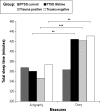Subjectively and objectively measured sleep with and without posttraumatic stress disorder and trauma exposure - PubMed (original) (raw)
Subjectively and objectively measured sleep with and without posttraumatic stress disorder and trauma exposure
Ihori Kobayashi et al. Sleep. 2012.
Abstract
Study objectives: Although reports of sleep disturbances are common among individuals with posttraumatic stress disorder (PTSD), results of polysomnographic (PSG) studies have inconsistently documented abnormalities and have therefore suggested "sleep state misperception." The authors' study objectives were to compare sleep parameters measured objectively and subjectively in the laboratory and at home in civilians with and without trauma exposure and PTSD.
Design: Cross-sectional study.
Setting: PSG recordings in a sleep laboratory and actigraphic recordings in participants' homes.
Participants: One hundred three urban-residing African Americans with and without trauma exposure and PTSD who participated in a larger study.
Interventions: N/A.
Measurements: Sleep parameters (total sleep time [TST], sleep onset latency [SOL], and wake after sleep onset [WASO]) were assessed using laboratory PSG and home actigraphy. A sleep diary was completed in the morning after PSG and actigraphy recordings. Habitual TST, SOL, and WASO were assessed using a sleep questionnaire. The Clinician Administered PTSD Scale was administered to assess participants' trauma exposure and PTSD diagnostic status.
Results: Participants, regardless of their trauma exposure/PTSD status, underestimated WASO in the diary and questionnaire relative to actigraphy and overestimated SOL in the diary relative to PSG. Among participants with current PTSD, TST diary estimates did not differ from the actigraphy measure in contrast with those without current PTSD who overestimated TST. No other significant group differences in discrepancies between subjective and objective sleep measures were found.
Conclusions: Discrepancies between subjectively and objectively measured sleep parameters were not associated with trauma exposure or PTSD. This challenges prior assertions that individuals with PTSD overreport their sleep disturbances.
Keywords: African Americans; Posttraumatic stress disorder (PTSD); actigraphy; polysomnography; sleep diary; sleep questionnaire; trauma.
Figures
Figure 1
Interaction effect between measure and group on total sleep time. **P < 0.01, ***P < 0.001.
Comment in
- Sleep perception among individuals with posttraumatic stress disorder.
Pillai V, Delahanty DL. Pillai V, et al. Sleep. 2012 Jul 1;35(7):897-8. doi: 10.5665/sleep.1940. Sleep. 2012. PMID: 22754032 Free PMC article. No abstract available.
Similar articles
- Comparison of Sleep Patterns in Vietnam Veterans With and Without Posttraumatic Stress Disorder Using Wrist Actigraphy.
Theal R, McLeay S, Gleeson S, Lowrie F, O'Sullivan R; PTSD Initiative. Theal R, et al. J Clin Sleep Med. 2019 May 15;15(5):725-732. doi: 10.5664/jcsm.7762. J Clin Sleep Med. 2019. PMID: 31053212 Free PMC article. - Sleep impairments in refugees diagnosed with post-traumatic stress disorder: a polysomnographic and self-report study.
Ansbjerg MB, Sandahl H, Baandrup L, Jennum P, Carlsson J. Ansbjerg MB, et al. Eur J Psychotraumatol. 2023;14(1):2185943. doi: 10.1080/20008066.2023.2185943. Eur J Psychotraumatol. 2023. PMID: 36971225 Free PMC article. Clinical Trial. - Exploring Predictors of Sleep State Misperception in Women with Posttraumatic Stress Disorder.
Arditte Hall KA, Werner KB, Griffin MG, Galovski TE. Arditte Hall KA, et al. Behav Sleep Med. 2023 Jan-Feb;21(1):22-32. doi: 10.1080/15402002.2021.2024193. Epub 2022 Jan 10. Behav Sleep Med. 2023. PMID: 35007171 Free PMC article. - Actigraphic sleep monitoring in patients with post-traumatic stress disorder (PTSD): A meta-analysis.
Lam L, Ho FY, Wong VW, Chan KW, Poon CY, Yeung WF, Chung KF. Lam L, et al. J Affect Disord. 2023 Jan 1;320:450-460. doi: 10.1016/j.jad.2022.09.045. Epub 2022 Sep 26. J Affect Disord. 2023. PMID: 36174789 Review. - Actigraphy in post traumatic stress disorder.
S Khawaja I, Madeeh Hashmi A, Awais Aftab M, Westermeyer J, D Hurwitz T. S Khawaja I, et al. Pak J Med Sci. 2014 Mar;30(2):438-42. Pak J Med Sci. 2014. PMID: 24772158 Free PMC article. Review.
Cited by
- Neighborhood disadvantage is associated with sleep disturbance in a sample of trauma-exposed Veterans.
Miller KE, So CJ, Brownlow JA, Woodward SH, Gehrman PR. Miller KE, et al. Sleep Health. 2023 Oct;9(5):634-637. doi: 10.1016/j.sleh.2023.06.006. Epub 2023 Jul 31. Sleep Health. 2023. PMID: 37532605 Free PMC article. - Psychiatric disorders and sleep.
Krystal AD. Krystal AD. Neurol Clin. 2012 Nov;30(4):1389-413. doi: 10.1016/j.ncl.2012.08.018. Neurol Clin. 2012. PMID: 23099143 Free PMC article. Review. - Sleep and mental disorders: A meta-analysis of polysomnographic research.
Baglioni C, Nanovska S, Regen W, Spiegelhalder K, Feige B, Nissen C, Reynolds CF, Riemann D. Baglioni C, et al. Psychol Bull. 2016 Sep;142(9):969-990. doi: 10.1037/bul0000053. Epub 2016 Jul 14. Psychol Bull. 2016. PMID: 27416139 Free PMC article. Review. - Predictors of Nightly Subjective-Objective Sleep Discrepancy in Poor Sleepers over a Seven-Day Period.
Herbert V, Pratt D, Emsley R, Kyle SD. Herbert V, et al. Brain Sci. 2017 Mar 9;7(3):29. doi: 10.3390/brainsci7030029. Brain Sci. 2017. PMID: 28282912 Free PMC article. - Effects of psychotherapies for posttraumatic stress disorder on sleep disturbances: Results from a randomized clinical trial.
Woodward E, Hackmann A, Wild J, Grey N, Clark DM, Ehlers A. Woodward E, et al. Behav Res Ther. 2017 Oct;97:75-85. doi: 10.1016/j.brat.2017.07.001. Epub 2017 Jul 8. Behav Res Ther. 2017. PMID: 28732289 Free PMC article. Clinical Trial.
References
- American Psychiatric Association. Diagnostic and statistical manual of mental disorders. fourth edition - text revision. Washington, DC: American Psychiatric Association; 2000.
- Kobayashi I, Boarts JM, Delahanty DL. Polysomnographically measured sleep abnormalities in PTSD: a meta-analytic review. Psychophysiology. 2007;44:660–9. - PubMed
- Lavie P. Sleep disturbances in the wake of traumatic events. N Engl J Med. 2001;345:1825–32. - PubMed
- Carskadon M, Dement W, Mitler M, Guilleminault C, Zarcone V, Spiegel R. Self-reports versus sleep laboratory findings in 122 drug-free subjects with complaints of chronic insomnia. Am J Psychiatry. 1976;133:1382–8. - PubMed
- Frankel BL, Coursey RD, Buchbinder R, Snyder F. Recorded and reported sleep in chronic primary insomnia. Arch Gen Psychiatry. 1976;33:615–23. - PubMed
Publication types
MeSH terms
Grants and funding
- 5R01HL087995-03/HL/NHLBI NIH HHS/United States
- R01 HL087995/HL/NHLBI NIH HHS/United States
- UL1 RR031975/RR/NCRR NIH HHS/United States
- 5K24MH001917-1/MH/NIMH NIH HHS/United States
- 1UL1RR031975-01/RR/NCRR NIH HHS/United States
- K24 MH001917/MH/NIMH NIH HHS/United States
LinkOut - more resources
Full Text Sources
Medical
